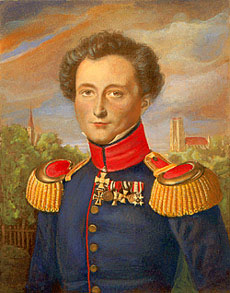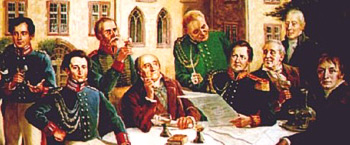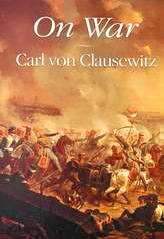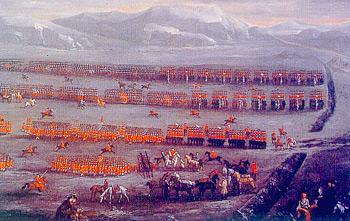|
|
||
|
Carl Philipp Gottfried von Clausewitz (June 1, 1780 - November 16, 1831) was a Prussian general and influential military theorist. He is most famous for his military treatise Vom Kriege, translated into English as On War.
Life and times Carl von Clauswitz was born in Magdeburg, Prussia in 1780. Clausewitz's father was an officer in the Prussian Army; Carl entered the Prussian military service at the age of twelve years, eventually attaining the rank of Major General.
He served in the Rhine Campaigns (1793-1794) when the Prussian army invaded France following the French Revolution in an attempt to restore the monarchy, and later served in the Napoleonic Wars from 1806 to 1815. Clausewitz entered the Kriegsakademie in Berlin (also cited variously as 'The German War School,' the 'Military Academy in Berlin,' and the 'Prussian Military Academy') in 1801 (age 21 years), studied the philosopher Kant and won the regard of General Gerhard von Scharnhorst, the future first chief of staff of the new Prussian Army (appointed 1809). Clausewitz, along with Hermann von Boyen (1771-1848) and Karl von Grolman (1777-1843), were Scharnhorst's primary allies in his later efforts to reform the Prussian army, between 1807 and 1814.
Clausewitz, serving as Aide-de-Camp to Prince August, was captured during the Jena Campaign in October of 1806 when Napoleon invaded Prussia and defeated the massed Prussian-Saxon army commanded by Karl Wilhelm Ferdinand, Duke of Brunswick (who was mortally wounded), in twin battles at Jena and Auerstedt (see Battle of Jena-Auerstedt) on October 14, 1806. Carl von Clausewitz, at the age of twenty-six years, became one of the 25,000 prisoners captured that day as the Prussian army distingrated. Both Carl von Clausewitz and Hermann von Boyen served during the Jena Campaign.
Clausewitz was held prisoner in France for two years (1806-1808) and upon release, subsequently served in the Russian Army from 1812 to 1813 during the Moscow Campaign. In the service of the Russian Empire, Clausewitz helped negotiate the Convention of Tauroggen (1812), which prepared the way for the coalition of Prussia, Russia, and the United Kingdom against Napoleon I of France and his allies.
He later re-entered the Prussian army, and was appointed chief of staff of Johann von Thielmann's Corps, and served at the Battle of Ligny and Battle of Wavre during the Waterloo Campaign in 1815. The Prussians were defeated on that day at Ligny (south of Mount St. Jean and the village of Waterloo) by an army led personally by Napoleon, but Napoleon's subsequent failure to destroy the Prussian forces led to his eventual defeat days later at the Battle of Waterloo when the Prussian forces arrived on his right flank late in the afternoon and joined the Anglo-Dutch forces pressing Napoleon's front.
Carl von Clausewitz was appointed director of the Kriegsakademie in 1818 and served until 1830. He married Countess Marie von Brühl and subsequently died in a cholera outbreak in 1831. His magnum opus on the Philosophy of War was written during this period, and was published posthumously by his widow in 1832.
Distinguishing military philosophers from military systems It is of first importance to distinguish what a military philosopher is as opposed to a military commander, such as Napoleon. Napoleon, Clausewitz' contemporary and the arch-enemy of the age, was a military commander, and one of the history's greatest and most storied conquerors. Napoleon clearly was a person of legendary intellect, personal drive, and capabilities, but he never undertook to write a detailed systematic treatise of his campaigns or military theories. It is very easy to find hundreds of quotes by Napoleon or attributed to him (who has to be one of the most quoted and quotable people in history), but these quotes are largely taken from letters, military dispatches, diaries, campaign reports, and eyewitness accounts, and are often taken out of context.
What we know of Napoleon's theories and methods come from study of his letters and his actions, the historical records of his campaigns and from the treatises of Antoine Henri Jomini who briefly served as a junior officer in Napoleon's armies under Marshal Michel Ney. As has been noted by other authors, Napoleon had little interest in instructing his commanders to be his equals in military thought (in 1813 Napoleon commented in response to Jomini's Treatise on Great Military Operations that 'It teaches my whole system of war to my enemies!'). In the end, as many have commented, that was his undoing as from 1811 to 1813 his allied enemies avoided battle with Napoleon directly and concentrated on eliminating forces commanded by his less competent Marshals and Generals.
Other commanders before Napoleon and Clausewitz wrote treatises on various military subjects of interest to them. For example, Marshal Sebastien le Prestre de Vauban, published four treatises that revolutionized modern fortifications, and Marshal Maurice de Saxe whose published memoirs-treatise, Mes Reveries (published posthumously in 1756), was the intellectual forerunner to 'Napoleonic tactics' or 'Grand Tactics.' Both served in the armies of Louis XIV, the 'Sun' King of France in the age immediately preceding the Napoleonic Era. But none undertook a great philosophical examination of war on the scale of Clauswitz and Tolstoy, who were both inspired by the events of the Napoleonic Era in which they lived.
Jomini was a direct contemporary rival of Clausewitz in post Napoleonic interpretation of Napoleonic warfare. Jomini's treatises, consisting of geometric diagrams and formula like statements, were initally more popular than Clausewitz' philosophies, but as time has shown, Jomini's works have faded into history and are now nearly forgotten while Clausewitz continues to be applicable (even in the nuclear age) to stir controversy and debate.
It is an arguable point whether one could equate Clauswitz with the ancient Chinese war philosopher and instructor, Sun Tzu or whether one could equate On War with The Art of War, but the two together are generally acknowledged as being the greatest military philosophers in history and the greatest written works of military philosophy. What Clauswitz accomplished was the introduction of systematic philosophical thought into Western military instruction and operational planning.
Sources: www.germannotes.com - part from Biography of Carl von Clausewitz, www.clausewitz.com, www.bestwebbuys.com, www.ifdt.de
|
||
|
|
||
|
|
||


 Carl
von Clauswitz was also a man of great intellect, and did
participate in actual military campaigns, but without the drive
to make himself emperor of his nation and attempt to conquer the
world. Instead, he was a person of thought and an instructor of
the next generations at the Kriegsakademie, and he was
interested in the examination of war. He undertook to write a
careful philosophical and systematic examination of war in all
aspects, as he saw it and taught it, and the result was his
principal work, On War, the West's premier work on the
Philosophy of War. His examination was so careful and considered
that it was only partially completed before his death.
Carl
von Clauswitz was also a man of great intellect, and did
participate in actual military campaigns, but without the drive
to make himself emperor of his nation and attempt to conquer the
world. Instead, he was a person of thought and an instructor of
the next generations at the Kriegsakademie, and he was
interested in the examination of war. He undertook to write a
careful philosophical and systematic examination of war in all
aspects, as he saw it and taught it, and the result was his
principal work, On War, the West's premier work on the
Philosophy of War. His examination was so careful and considered
that it was only partially completed before his death.